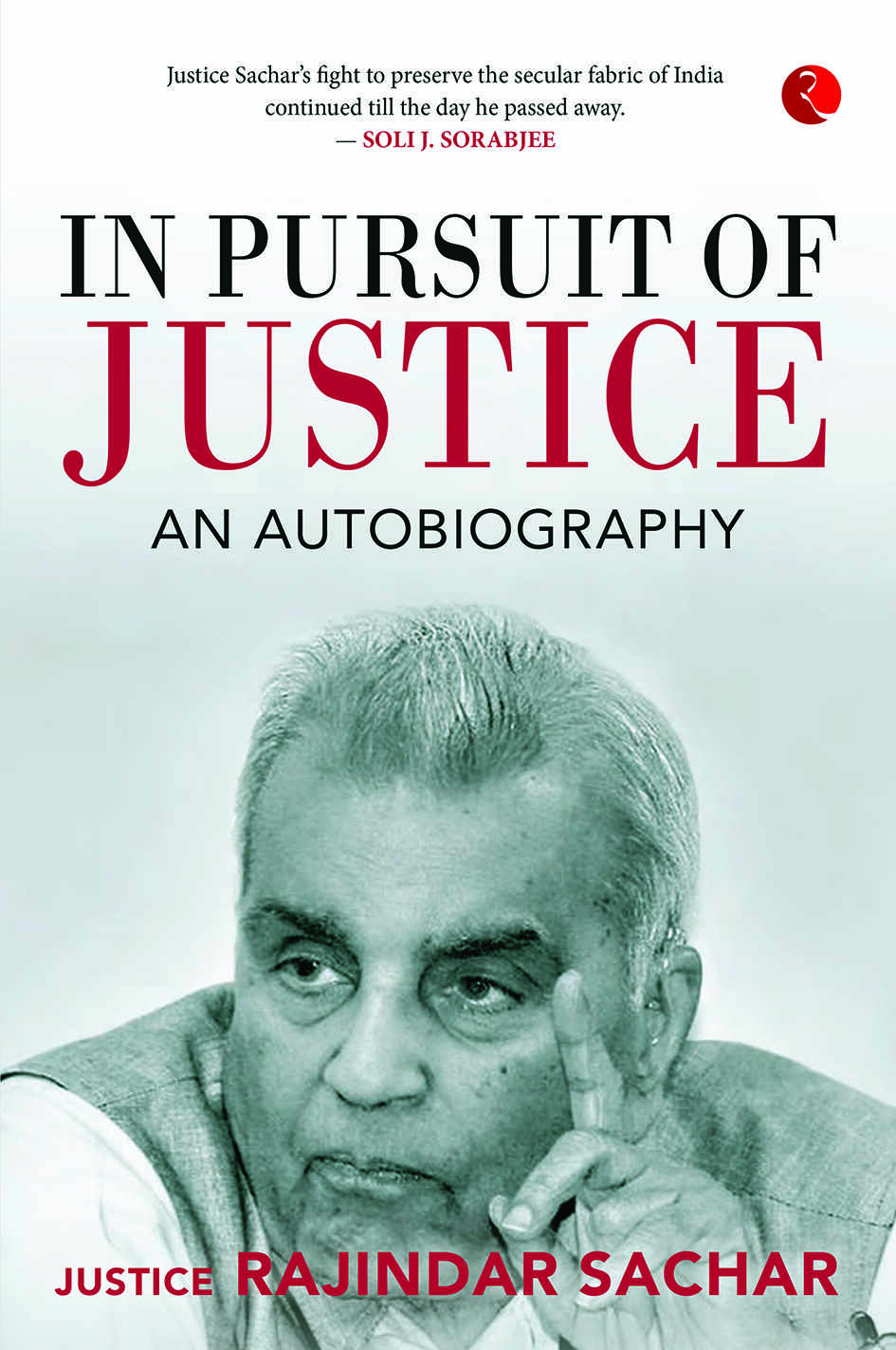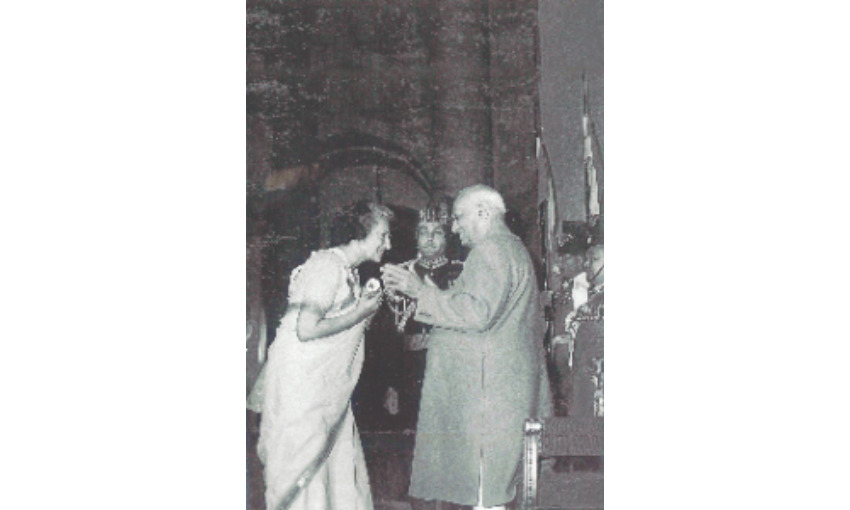"IN PURSUIT OF JUSTICE: An Autobiography" | Indira & Judiciary
In Pursuit of Justice is the story of a great jurist who was an even greater human being – his autobiography comes at a critical time when India’s democracy is under siege from within; Excerpts:
Author: Justice Rajindar Sachar
Publisher: Rupa Publication
My father used to say that nothing should come in the way of performing one’s duty, and he had lived by that principle. He would have expected me to do the same—keep my distress and sense of deep loss aside and finish the task I had been busy with over the past four months.
I had been back at the Delhi High Court for barely five weeks when the Janata government appointed me as chairman of the High Powered Expert Committee on Companies and the Monopolies and Restrictive Trade Practices Acts.

The brief was as follows: ‘To consider and report on what changes are necessary in the Companies Act, 1956, and the Monopolies and Restrictive Trade Practices Act, 1969, with particular reference to the modifications which are required to be made in the form and structure of the Companies Act, 1956, and the Monopolies and Restrictive Trade Practices Act 1969, so as to simplify them and to make them more effective, wherever necessary.’
The committee was set up because in the eight years that the Monopolies and Restrictive Trade Practices Act, 1969, had been in force, several issues had come to the fore—difficulties were encountered in its implementation and lacunae were noticed in its provisions. Due to these factors, the law had not succeeded in achieving the objective for which it had been enacted.
The committee’s first chairman was K.S. Hegde. Since he had been elected speaker of the Lok Sabha, the government asked me to head the committee. Among the ten members were three members of Parliament—S. Ranganathan, former comptroller and auditor general of India; R.D. Gattani, retired judge of the Rajasthan High Court; and Bedabrata Barua. Then there was eminent lawyer F.S. Nariman; Shantanu N. Desai, former president of the Institute of Chartered Accountants; M. Srinivasa, former president of the Institute of Costs and Works Accountants of India; leading industrialists D.C. Kothari and Keshub Mahindra; K.P. Tripathi, labour leader; and K.K. Ray, barrister at law.
It was an ambitious task, spread across major cities in the country. The committee had decided to travel to various states to enable maximum public participation. The idea was to have oral hearings and accept written memoranda as well.
Our first visit was to Bangalore. While the rest of the members flew, I had decided to go by train as I was taking my wife and daughter with me. At the last minute, my doctor advised me to postpone my trip for two days. Because of this, I ended up flying to Bangalore with my wife and daughter as I was short on time.
The members were put up in a five-star hotel, as is usual for such committees. Feeling guilty about accepting such facilities from the government, I booked a room in a government rest house.
Our next halt was Madras. That night, the secretary of the commission came to my room to convey the news he had received from Delhi about the death of my father. I will not describe my feelings because such matters are private. From Madras the committee members were to proceed to Bombay for more hearings. I had the option to cancel the Madras and Bombay sittings, but my conscience did not allow me to let personal feelings interfere with public duty. So I decided that
the sittings at Madras and Bombay would be presided over by Fali Nariman. I flew back to Delhi the next morning.
Once the sittings were over, the committee held a number of meetings to finalize the report. We had decided that no information would be given out either about the details of the report or the date of its release. Still, a week or two before the report was to be released, some details from it appeared in the press. The following day, I told the members that as penance I would forgo lunch. It goes without saying that the committee went on with its work of finalizing the report in a cordial manner.
Following the completion of the report, one of the committee members hosted a dinner where, as usual, drinks were being served. I was puzzled to see that one of our members, a former judge from Rajasthan who had made a valuable contribution to the report, was sitting in another room. The host, who was very understanding, disclosed that the gentleman had refused to sit with the others as they were drinking. I have never understood this kind of attitude. In my view it amounts to being inconsiderate. Anyway, I gave him company, for I am a teetotaller myself and also never serve liquor at home.
Another awkward situation concerning the same gentleman arose when I invited the committee members to a farewell lunch at my residence. Barely fifteen minutes before he arrived, he informed me that being a strict vegetarian he did not eat any preparation that had onion in it. As far as the vegetable dishes were concerned, I was relieved that the onions were not visible. But my wife had prepared rice with jeera and onions, which were clearly visible. I told my wife to remove the onions and put the rice in a separate bowl. When the gentleman asked me if there was any onion in the food, I said with a bland expression that there was none, hoping that he would not catch a whiff of it. Fortunately, he did not notice anything amiss. Later I asked myself if I had committed a sin and came to the conclusion that I hadn’t—it was a harmless action to salvage an awkward situation.
vvv
Of the many matters we dealt with in the course of our review of the Companies Act, two are of current interest and continue to be debated, namely, the issue of workers’ inclusion in a company’s board of directors, and propriety with regard to making political contributions. In dealing with the issue of workers’ inclusion in the board of directors of a company, the committee took a cue from the Constitution:
v [The] Constitution of India in its Directive Principles of State Policy has directed in Article-43A that ‘The State shall take steps, by suitable legislation or in any other way, to secure the participation of workers in the management of undertakings; establishment or other organizations engaged in any industry’.
v Earlier, the Second Five Year Plan document had also laid down [that], ‘a socialist society is built not solely on monetary incentives but on ideas of service to society and the willingness on the part of the latter to recognise such services’. It is because of this mandate in our Constitution that the terms of the reference [of] the Committee require us to report the measures by which—and not whether—workers’ participation in the share capital and management of the companies is to be brought about.
v Accepting this mandate of the Constitution, the Committee now proceeds to deal with the various steps, the modality and the measures by which such participation by the workers on the board of the companies could be meaningfully brought about. We may at once state that our recommendations on this aspect would apply both to Government as well as nonGovernment companies.
(Excerpted with permission from In Pursuit of Justice, published by Rupa Publications)



